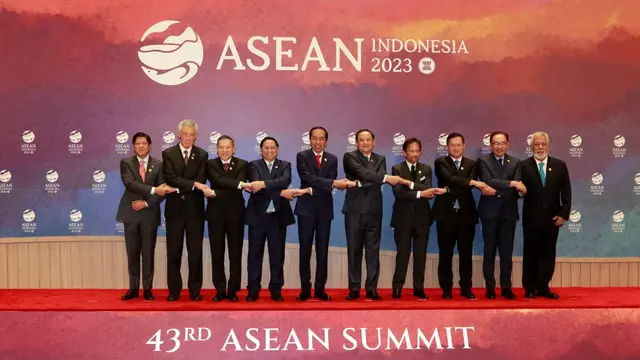Indonesia is hosting the 43rd Association of Southeast Asian Nations (ASEAN) Summit and several other high-profile meetings associated with the Summit in Jakarta from September 5 to 7. Leaders from 22 countries and nine international organizations are attending the summit, making it the largest of its kind ever.
ASEAN, which was founded in August 1967, is a political and economic organization consisting of 10 countries located in the Southeast Asian region, namely Indonesia, Thailand, Singapore, Malaysia, the Philippines, Brunei, Cambodia, Vietnam, Laos and Myanmar.
As a grouping, ASEAN is the fifth-largest economy in the world, with a combined GDP of $3.3 trillion in 2021. ASEAN has become one of the fastest growing regions in recent years.
Due to geopolitical relations, the role of ASEAN in regional affairs and governance has attracted much attention from the international community. ASEAN has become an important force influencing regional and international affairs.
Nevertheless, ASEAN is facing multi-dimensional challenges, ranging from economic slowdown, intensifying geopolitical tensions in the world, climate change, and great power rivalries to the peace and stability in the region. During the ASEAN foreign ministers gathering on September 4, Mohammad Mahfud, Indonesia's coordinating minister in charge of political, legal and security affairs, told the region's top diplomats that "Our community's strength is being challenged by one crisis after another." To deal with these challenges, leaders from the Southeast Asian countries are discussing ways to ensure ASEAN's continued relevance and centrality in the evolving regional geopolitical architecture.
Indonesia's chairmanship in this year's ASEAN Summit has the theme "ASEAN Matters: Epicentrum of Growth." The priority for the 43rd ASEAN Summit focuses on how to strengthen ASEAN to become a fast-growing, inclusive, and sustainable economic region amid a changing world. This year's theme reflects ASEAN's determination to take its own development as the primary goal.
On September 5, during his speech to the plenary session, likening ASEAN to a large ship, Indonesian President Joko Widodo stressed that "the ASEAN countries together should realize equal and mutually beneficial cooperation to sail together towards the epicentrum of growth."
There are many topics on the agenda for the 43rd ASEAN Summit. Nevertheless, the focus is on the economy. How to achieve a fast-growing and inclusive growth by providing new impetus to the regional economy is the top priority among the member countries.
Attracting investment and boosting trade are vital for ASEAN. The ASEAN countries have enormous natural resources. They could offer huge potential opportunities for foreign investors. During the Summit, leaders discussed how to deepen cooperation in emerging areas such as the digital economy, e-commerce, food security and green economy. Deepening cooperation in these areas will make ASEAN more resilient to cope with future challenges.
The leaders also discussed the way to push for regional integration during the Summit. Economic fragmentation could slowdown regional economic growth and make ASEAN harder to tackle emerging challenges.
Through regional integration and improved connectivity, market access between member countries can be expanded and two-way investment areas can be increased, thereby expanding intraregional trade and two-way investment.
The other priorities for this summit include the improvement of institutional efficiency, the Code of Conduct regarding the South China Sea, the ASEAN Outlook on the Indo-Pacific Region, and the violent conflict occurring in Myanmar. The local situation in Myanmar is deteriorating and it has sunk into violence during recent months, which has left a negative mark on ASEAN, facing mounting pressure to solve the conflict.
The deliverables of Indonesia's chairmanship for the 43rd ASEAN Summit are in line with the theme of "ASEAN Matters: Epicentrum of Growth." A number of outcomes and decisions have been achieved during the Summit to promote ASEAN as a sustainable and inclusive growth hub in the world, including the ASEAN Declaration on Disability-Inclusive Development and Partnership for a Resilient ASEAN Community, ASEAN Declaration on Gender Equality and Family Development, the ASEAN Leaders' Declaration on Strengthening Food Security and Nutrition in Response to Crises, among others.
During the Summit, the leaders also endorsed the ASEAN Blue Economy Framework, which aims to make the blue economy the new engine for the region's future growth through an integrated and holistic approach that creates value-added resources from oceans and fresh water in a sustainable and inclusive way. It is also perceived by some as the region's response to Japan's controversial plan to discharge the contaminated water from the Fukushima Daiichi Nuclear Power Plant into the sea.
At the 43rd ASEAN Summit, the leaders also agreed to pursue the transition to green energy by reducing carbon emission, promoting regional payment connectivity and regional economic integration, and facilitating the use of local currency in cross-border transactions, all of which are important to achieve sustainable and inclusive economic growth in the Southeast Asian region.
China's Premier Li Qiang is leading the Chinese delegation to the 43rd ASEAN Summit and related meetings, as well as making a visit to Indonesia from September 5 to 8, which demonstrates that China values much for its collaboration with ASEAN.
China and ASEAN have been each other's largest trading partners for years. ASEAN is China's immediate neighbor; this geographical location and improving regional connectivity have laid the foundation for boosting bilateral trade and investment. The implementation of the Regional Comprehensive Economic Partnership is also expected to forge closer bilateral economic ties in the coming years.
(CGTN)
 简体中文
简体中文

